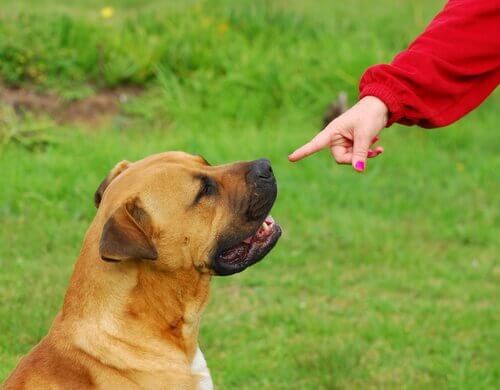Learn About Some of the Skills Dogs Have!


Written and verified by the lawyer Francisco María García
Dogs have tons of skills, although some of them can be a bit annoying! For example, they’re very good at escaping from your house at the slightest opportunity and roaming the streets. But this usually happens because they’ve been bored, stuck inside all day.
One way to avoid that is to take your dog on a fast, 1-hour walk every single day if you can.
Dogs and their skills

Incentive to shake your hand
If you want your dog to shake your hand on command, you can start by having a treat in your hand and letting it pick up the smell. Reward it any time it moves its paw, and wait for it to touch your hand with that paw. Once your dog realizes that touching your hand is the key to the reward, you should start to move it farther away each time.
You can help improve your dog’s skill by moving your hand higher and higher. Later on, you can add things like a hand signal and a verbal command to the game. You can also play in places with more distractions and start in different positions.
Training
You can improve dogs’ skills a lot through training. To do that, you’ll need to do exercises and activities involving coordination, balance, skill, self-control, and concentration. It doesn’t matter what breed, age, size, or build your dog is, either. In theory, any dog can learn these kinds of things.
Teaching your dog skills can help them avoid boredom and gives them a way to exercise their mind. Plus, you’re also creating better communication, which strengthens the bond and trust between the two of you. If you think about it, that’s a big part of getting them to obey you.
Exercises with any dog
You can carry out these skill exercises with any dog. There are no limits related to age, size, or anything else. You can also do the training anywhere: in your house, in the backyard, or wherever else comes to mind. Plus, everyone in your family can participate, even little kids!
A few minutes is more than enough to help most dogs pick up new skills. The important thing is to have fun and spend time with your dog. You’ll share some nice moments and strengthen the trust between you and your best friend even more.
Lots of skills and options
Imagination has no limits when it comes to thinking of the skills dogs could do, but here are some especially common ones:
- Sitting when they’re told to
- Laying down when they hear the word
- Walking without pulling on their leash – this also makes your life much easier when you’re with them
- Barking, or being quiet, when you tell them to
- Picking up objects and bringing them to you
- Following a scent
- Not crossing physical boundaries without your permission
- Funny actions
- Remembering things – dogs have a pretty good memory and can learn to use it in unfamiliar situations
- Recognizing people – once you’ve formed a bond with a dog, it will always react the same way when it sees you, especially if it associates you with a positive memory
- Colors – dogs don’t exactly have color vision, but they can see a kind of grayscale that helps them tell things apart.
- Body language. Dogs’ ears, tail, posture, pupil dilation, and many other things say a lot about what’s going on inside their head. They communicate a lot with body language; you just have to learn to look.
Smell

It has been proven that dogs’ sense of smell is a hundred times more powerful than ours. They have an amazing ability to pick out specific smells and trace them to their source.
So, when you don’t let a dog use its nose during your walks, it might start to interact improperly with the other dogs it crosses paths with. It might become obsessed and constantly try to go farther, tugging on the leash with no place in mind. They often do this out of restlessness.
Don’t stop your furry friend from smelling things, and people. It’s actually better to encourage this behavior (so long as it doesn’t bother anyone). This way, you’re letting your dog make use of its most powerful ability: its sense of smell.
Dogs have tons of skills, although some of them can be a bit annoying! For example, they’re very good at escaping from your house at the slightest opportunity and roaming the streets. But this usually happens because they’ve been bored, stuck inside all day.
One way to avoid that is to take your dog on a fast, 1-hour walk every single day if you can.
Dogs and their skills

Incentive to shake your hand
If you want your dog to shake your hand on command, you can start by having a treat in your hand and letting it pick up the smell. Reward it any time it moves its paw, and wait for it to touch your hand with that paw. Once your dog realizes that touching your hand is the key to the reward, you should start to move it farther away each time.
You can help improve your dog’s skill by moving your hand higher and higher. Later on, you can add things like a hand signal and a verbal command to the game. You can also play in places with more distractions and start in different positions.
Training
You can improve dogs’ skills a lot through training. To do that, you’ll need to do exercises and activities involving coordination, balance, skill, self-control, and concentration. It doesn’t matter what breed, age, size, or build your dog is, either. In theory, any dog can learn these kinds of things.
Teaching your dog skills can help them avoid boredom and gives them a way to exercise their mind. Plus, you’re also creating better communication, which strengthens the bond and trust between the two of you. If you think about it, that’s a big part of getting them to obey you.
Exercises with any dog
You can carry out these skill exercises with any dog. There are no limits related to age, size, or anything else. You can also do the training anywhere: in your house, in the backyard, or wherever else comes to mind. Plus, everyone in your family can participate, even little kids!
A few minutes is more than enough to help most dogs pick up new skills. The important thing is to have fun and spend time with your dog. You’ll share some nice moments and strengthen the trust between you and your best friend even more.
Lots of skills and options
Imagination has no limits when it comes to thinking of the skills dogs could do, but here are some especially common ones:
- Sitting when they’re told to
- Laying down when they hear the word
- Walking without pulling on their leash – this also makes your life much easier when you’re with them
- Barking, or being quiet, when you tell them to
- Picking up objects and bringing them to you
- Following a scent
- Not crossing physical boundaries without your permission
- Funny actions
- Remembering things – dogs have a pretty good memory and can learn to use it in unfamiliar situations
- Recognizing people – once you’ve formed a bond with a dog, it will always react the same way when it sees you, especially if it associates you with a positive memory
- Colors – dogs don’t exactly have color vision, but they can see a kind of grayscale that helps them tell things apart.
- Body language. Dogs’ ears, tail, posture, pupil dilation, and many other things say a lot about what’s going on inside their head. They communicate a lot with body language; you just have to learn to look.
Smell

It has been proven that dogs’ sense of smell is a hundred times more powerful than ours. They have an amazing ability to pick out specific smells and trace them to their source.
So, when you don’t let a dog use its nose during your walks, it might start to interact improperly with the other dogs it crosses paths with. It might become obsessed and constantly try to go farther, tugging on the leash with no place in mind. They often do this out of restlessness.
Don’t stop your furry friend from smelling things, and people. It’s actually better to encourage this behavior (so long as it doesn’t bother anyone). This way, you’re letting your dog make use of its most powerful ability: its sense of smell.
This text is provided for informational purposes only and does not replace consultation with a professional. If in doubt, consult your specialist.








